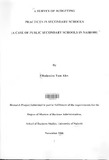| dc.description.abstract | Education is a major exist route from poverty. It's therefore necessary that relevant policies are
put in place to ensure accessibility to education by a majority of Kenyans. It's only by so doing
that sustainable economic development can be achieved. To enhance efficient resource
utilization in schools effective budgeting and budgetary control practices have to be put in place.
The objectives of this study were to establish the budgeting practices among public secondary
schools operating in Nairobi area province, to determine the perceived benefits of budgeting by
public secondary schools managers and establish factors that secondary schools consider when
undertaking a budgetary process. To achieve these objectives a survey was conducted and data
collected by the use of structured questionnaires that were administered by the researcher. The
questionnaires where dropped and picked latter from those respondents who were able and
willing to fill them on their own. A database was created using Excel, and SPSS package was
used for data analysis.
The study established that most secondary schools do not have a strategic plan to guide them
towards achievement of both long-term and short-term objectives. Also evident from the study
was the fact that schools with a large number of students, large parcels of land and many staff
employed and paid by the school tend to charge a high amount of fees. The size of the school in
terms of student population had no effect on occurrence of deficit or surplus in the school
operations. The heads of secondary schools had received training in financial management. And
before budgets were prepared interdepartmental meeting were held. After the budget had been
prepared, but before approval, it had to be negotiated between HODs and higher management.
The most commonly prepared budget was the income and expenditure budget with only a few
schools preparing the cash budget and long-term asset acquisition budget, despite the fact that
most of them had incurred expenditure on long-term investment. Although the research findings
indicated that Activity Based Budgeting (ABB) was the commonly used budgeting approach, I
highly doubt if it is actually done based on the principals of ABB.
The study also established that the number of students in the school was mostly considered as a
key budgeting factor during the budgetary process. Also considered are top management support
and clear and realistic goals. Participation by all employees was least considered as a significant
budget success factor. According to Lucey (1995) participation promotes common understanding
regarding objectives and makes acceptance of organizational goals by individuals more likely,
which benefit is unlikely to be achieved in secondary schools.
Further the study established that budgeting had a lot of perceived benefits such as cost control,
co-ordination of operations and efficient and effective resource allocation. Motivation of staff
was perceived as the least benefit derived from budgeting. Despite all the above benefits,
budgeting process was found to be facing challenges such as cost escalation beyond anticipation,
budget implementation problems and lack of education for individuals involved. | en |

